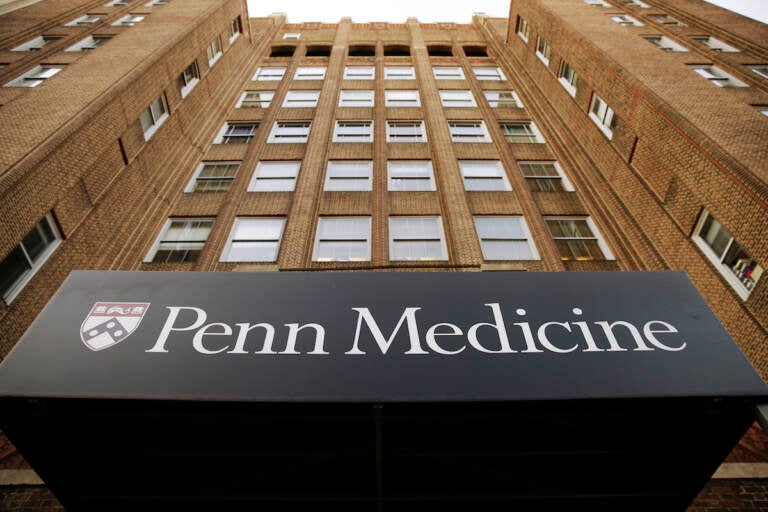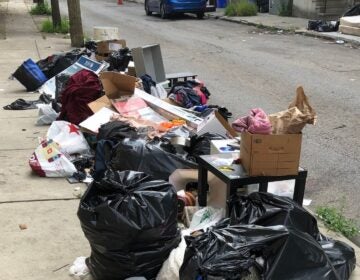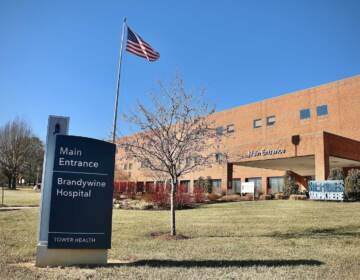Penn Medicine partners with health department to expand virtual ‘bridge clinic’ for people with substance use disorder
Penn Medicine has expanded its telehealth program to increase access to medication that helps people stop using opioids.

A sign at the Hospital of the University of Pennsylvania in Philadelphia, Wednesday, Feb. 6, 2019. (AP Photo/Matt Rourke)
Buprenorphine has been shown to help people with substance use disorder by reducing cravings and withdrawal symptoms. However, lack of transportation and long wait times at emergency rooms can be barriers to access the drug that can be lifesaving. It also can be difficult just to make an appointment while suffering withdrawal symptoms like nausea and chills.
At Penn Medicine and elsewhere, there have been efforts to make it easier for physicians to prescribe buprenorphine as a “bridge” medication, which would help patients make the transition from contact with hospital settings toward long-term recovery.
Penn Medicine hopes to reach more people with substance use disorder by expanding its telehealth program. Patients can now meet providers virtually to quickly access medication- assisted treatment and other recovery services.
“People are able to come to the virtual appointments, because transportation is not a barrier or scheduling isn’t a barrier,” said Penn Medicine peer recovery specialist Nicole O’Donnell. “When you’re struggling, you’re in withdrawal, it’s really hard to maneuver to get to a doctor’s appointment.”
O’Donnell said Penn’s is the only such program in the eastern half of Pennsylvania.
In March 2020, the U.S. Drug Enforcement Administration issued guidance temporarily modifying some regulations for prescribing buprenorphine, which allowed Penn Medicine to launch the first version of its “virtual bridge clinic.” Providers at the hospital system say it helped them reach patients who otherwise wouldn’t have access to an appointment, especially during pandemic lockdowns.
Penn Medicine has recently expanded the program by partnering with the Philadelphia Department of Public Health.
The partnership has allowed the hospital system to hire additional substance use navigators, who field calls for help, assess patients’ care needs, and link patients to providers and other relevant support, such as counseling.
Penn Medicine also has created training opportunities for clinicians who can prescribe medications virtually. Staff from the health system’s Center for Addiction Medicine and Policy have now trained all providers from Penn Medicine OnDemand – the health system’s 24/7 virtual urgent care telemedicine service – to evaluate patients with substance use disorder and prescribe buprenorphine.
Patients can speak to a provider on a phone or computer to receive same-day prescriptions of buprenorphine, get referrals to long-term care, and receive prescriptions of Narcan, an overdose-reversing medication. So far this year, more than 50 patients have participated in the program, and 72 prescriptions have been written.
As overdose deaths rise in Philadelphia, officials say increasing access to treatment is crucial. There were an estimated 1,250 overdose deaths in Philadelphia last year. Health officials say the synthetic opioid Fentanyl is contributing to overdose deaths — it’s 80 to 100 times stronger than morphine. In 2019, 33% of all drugs seized in Philadelphia contained fentanyl, and 878, or 76%, of all overdose deaths in the city involved fentanyl or a fentanyl analog.
This month, the Centers for Disease Control and Prevention announced nearly 108,000 people in the United States died from drug overdoses in 2021 — a record high.
O’Donnell said she understands that the Penn Medicine program won’t help everyone, especially those who don’t have access to a phone or the internet. However, she said it has benefited those who get disconnected from care.
“I had a patient the other day, he started Suboxone while incarcerated. He was on it for about a month. He was released, but he didn’t have medication that he was released with. So we were able to get medication for the interim,” O’Donnell said.
She said that patients don’t need insurance to access the bridge clinic.
WHYY is your source for fact-based, in-depth journalism and information. As a nonprofit organization, we rely on financial support from readers like you. Please give today.







